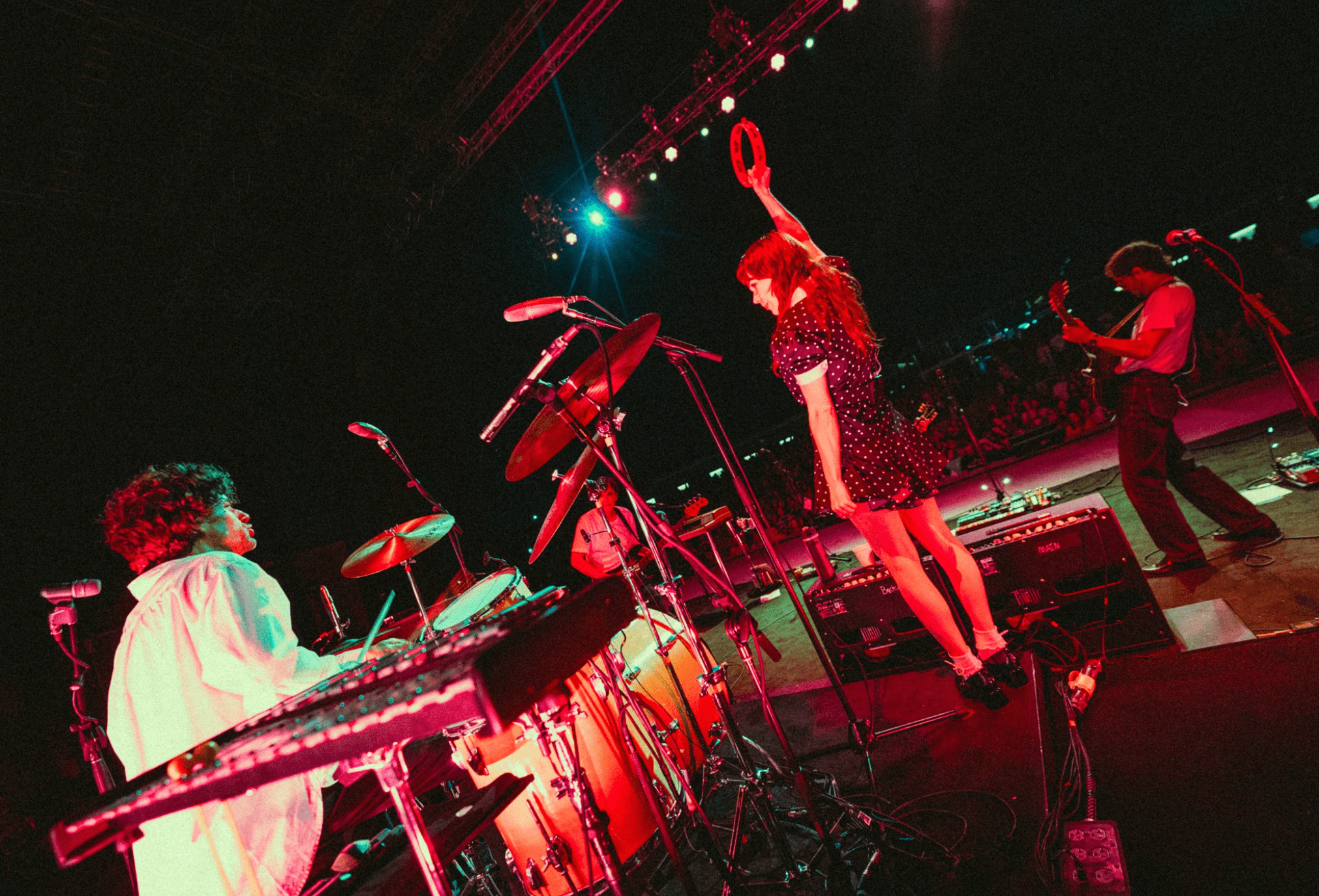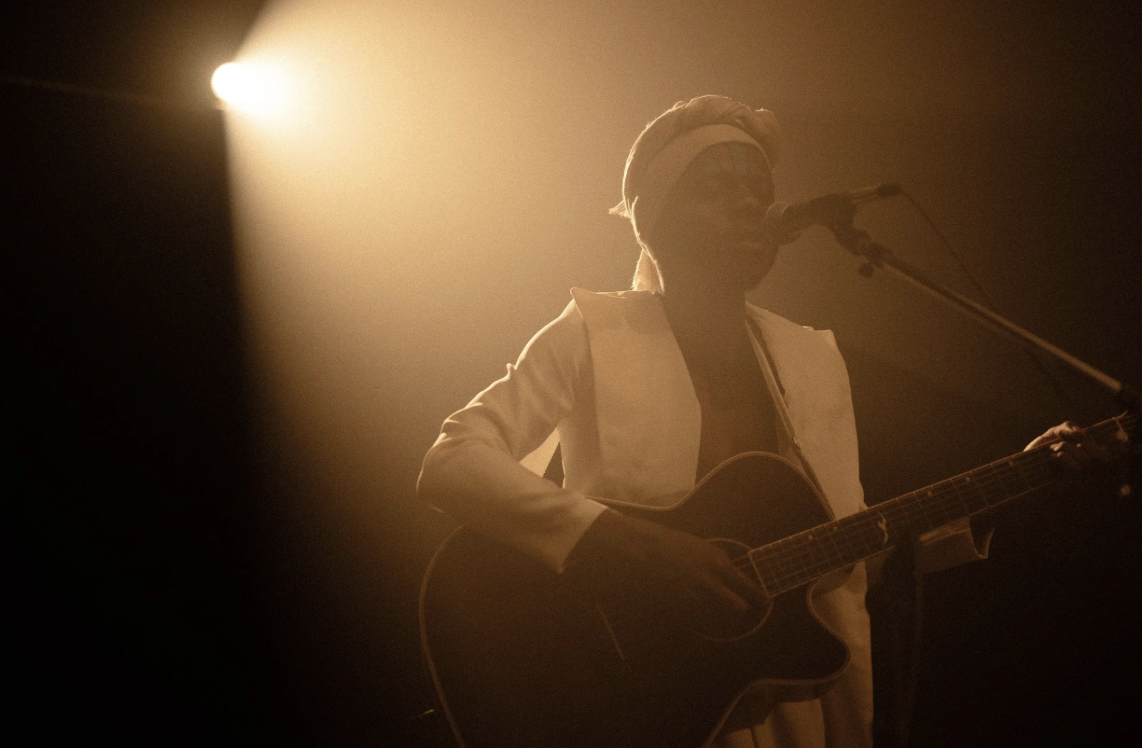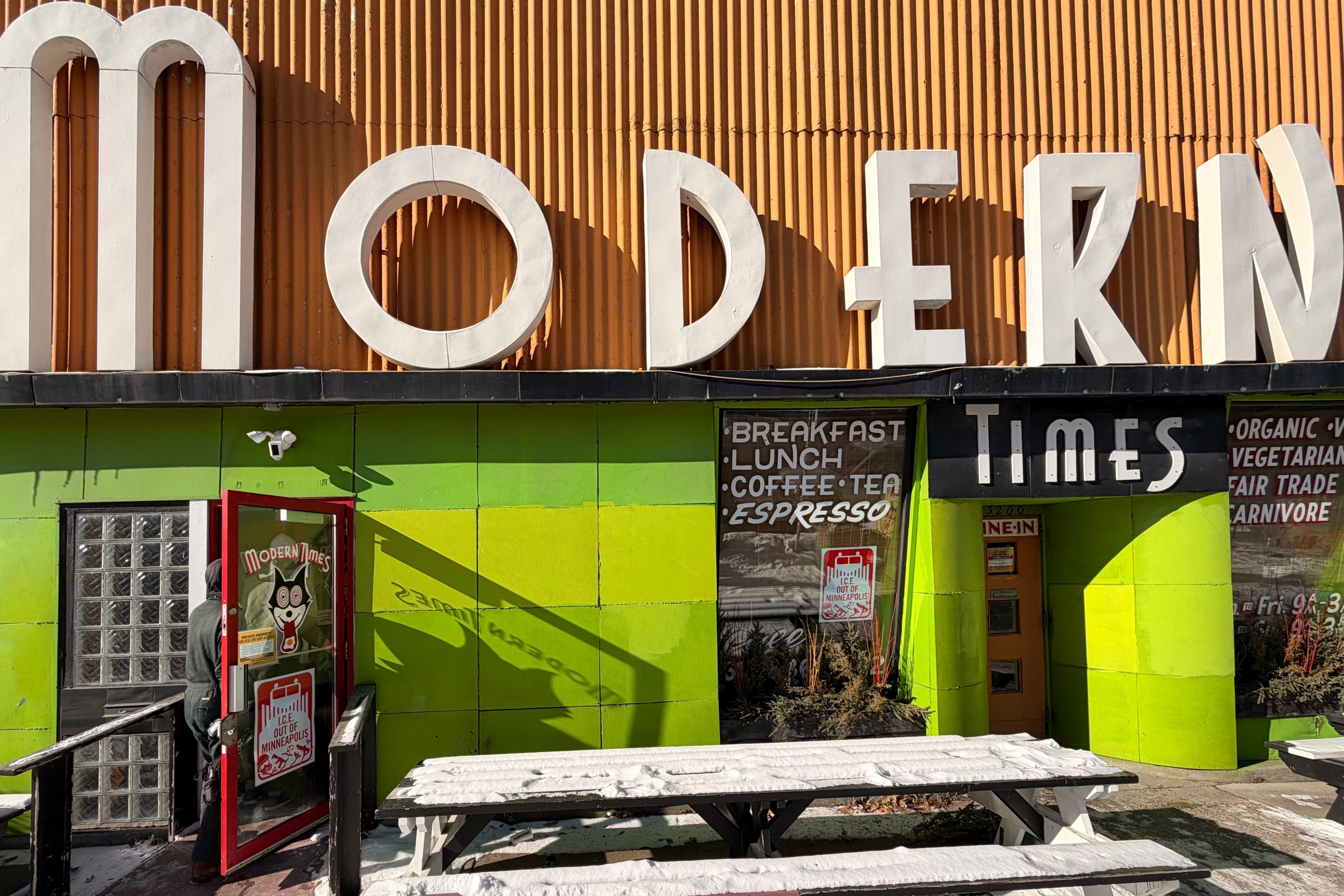If you were at St. Paul’s Palace Theatre Tuesday night to see Rilo Kiley, congratulations. You have survived your teens and by the looks of most of you, your 20s as well. Some even your 30s. Jenny Lewis, Blake Sennett, Pierre de Reeder, and Jason Boese were on hand not only to remind us what a great band they were (and still are), but also what a mess you (and they) used to be (and maybe still are a little, but let’s be honest, hardly as much).
The night began with the end of the world: The title track from the band’s 2002 breakthrough album, The Execution of All Things, with Lewis calling upon god to wipe us all out over an anthemic chord progression that belied her doomerism. Then again, that song may also just be about moving from California to Nebraska—Lewis has a knack for making you feel like you know just what she’s singing about till you try to explain it. One allusive lyric, one unexpected vocal leap can make the rest feel emotionally true. (And maybe you shouldn’t try to explain—check out the band’s Genius page if you want to see how eager paraphrase can shortchange rock lyrics.)
Rilo Kiley stayed in 2002 for two more songs: the are-we-or-aren’t-we road trip journal “Spectacular Views” (“It’s so fucking beautiful,” everyone sang along), complete with guitar hero outro from Sennett, and then “Paint’s Peeling,” with Lewis lamenting, “It's a hard day for dreaming again.”
These are songs you write when you’re young, when you first feel like you’ve gained insight into life, which are often the best songs. The band members were in their late 20s when they recorded them, and you may never feel as old again as you did with 30 looming. While many of Lewis’s lyrics are more poetic, none nails the mood of The Execution of All Things as perfectly as the straightforward “And we’ve been talking all night.” Early Rilo Kiley songs are strands of those young, late-night convos recollected at dawn and recontextualized by ingenious guitar fillips.
Now on the cusp of 50, Lewis, thrift-stylish as ever in a polka dot dress and black patent leather shoes, has grown from older sister to cool aunt in the days since the band’s breakup some indeterminate time after 2007. (It took’em a while to rip that band aid off.) And those fans have grown too—there were a lot of couples in the crowd, plenty of what my buddy Jay, my +1, called (without malice) “mortgage-holders.” Many in attendance were too young to have caught the band live before (including Jay). This was one of those gratitude shows for the former kids.
It was also, as Lewis called it, “a time capsule,” but with the potential to be more. Hearing a band capture how you feel can make you feel less alone. Seeing that band live can make you realize you’re part of a community that feels that way. Reuniting with that band and that audience years later can rouse the empathy for your younger self that allows you to feel even greater empathy for others.
That said, Rilo Kiley were a band for their time. Their records capture in an oblique way how I felt throughout the Bush years as accurately as anything this side of Metric’s Old World Underground, Where Are You Now? But they never quite fit into a category. They were too slick for the janky indie rock that was going out of style with the new millennium, but not histrionic enough for the emo the new generation preferred. And though you can hear why Lewis identified a kindred spirit in Conor Oberst’s gauche earnestness and why Ben Gibbard enlisted Lewis for his gently twinkling Postal Service, even here the differences with those peers outweigh the similarity. Besides, Rilo Kiley wanted to be big—or at least sound big.
Yet Rilo Kiley weren’t “commercial” either, as Warner Bros. would eventually learn. For prestige rock bands of that era or their knock offs (i.e., not nu-metal or yowling scrunge) commercial meant the garage rock revivalism huffing the fumes of a stalling “rock is back” movement or the ascendant mall emo of Fall Out Boy and My Chemical Romance and (if you insist) Panic! at the Disco.
At the Palace, we heard six songs from Rilo Kiley’s great big sell-out record More Adventurous, which climbed all the way up to No. 161 on the Billboard charts in 2004, including the opening cut, “It’s a Hit,” which, of course, it was not. A dense string of associative images linking Bush, shit-flinging, Iraq, false suburban fronts, crybaby songwriters, and, well, execution again, before sardonically celebrating “a holiday for a hanging.” As protest music goes this is hardly Rock Against Bush stuff—more a question of working through the interconnections between the political and personal and social. You could even, gosh, call it poetry.
More Adventurous is also the album where Lewis stepped to the fore as a singer, and where she began to explore the country-soul direction she’d soon follow solo. You know how if you say a word over and over it loses its meaning? To hear Lewis sing “I Never,” which repeats the second word of its title more times than I care to count, is the opposite. And “Does He Love You?”, in which Lewis works her way through her ambivalence about marriage, playing two sides of a love triangle as the music crescendoes, remains a showstopper.
A lot of guys take a woman’s sexual and emotional openness the wrong way, and a lot of them wrote about Jenny Lewis in the ’00s. (“There was a whole thing about how the quality of the music declined as my shorts got shorter,” she lamented good-naturedly in 2023.) So it’s poetically just that Lewis has had a pronounced influence on younger women. Writer Jenn Pelly acknowledged Lewis as “the first feminine voice I ever encountered leading a band outside the mainstream” in a 2019 piece for Pitchfork that also revealed that Katie Crutchfield of Waxahatchee has a tattoo of the album cover to The Execution of All Things.
To talk about Rilo Kiley, ultimately, is to talk about Lewis’s voice, and voices are mysterious things. In her Pitchfork review of Take Offs and Landings, Alison Fields criticized Lewis for singing in “that breathy, pouty little girl way favored by far too many female singer/songwriters these days.” (This was back when the Fork considered “Should a band be derided if their music appears in an episode of a heavily scorned teen drama on the WB?” a question worth asking; Dawson’s Creek, if you’re wondering.) “Too theatrical for indie naturalism yet too wry for naked megapop corn, [Lewis] pinpoints emotional nuance in the broadest melodrama by never revealing exactly how much distance from the heart of a song she does or doesn't maintain,” is how I approximated it in a review of More Adventurous two decades ago, and I’m still trying to do better.
Though he often plays second banana to Lewis, who he (jokingly? pointedly?) introduced as “the lead singer in my band,” Sennett’s full guitar tone defines Rilo KIley at least as much as her voice. Tuesday night’s performance exorcised any doubts about that, even though I’d quibble that some of his baroque power-pop figures were too high in the mix. Sennett is a great one for echoing a song’s melody in a solo then tweaking it creatively from there, and when his lead harmonized with the band’s third guitarist, the grand effect was more Queen than Allmans.
Is there a rivalry between the two longtime friends and former lovers? Critics have long sniffed around for evidence, and maybe we got a whiff of it the other night. After Sennett told us that his dad was born in St. Paul, Lewis one-upped him by saying she had brothers in Hastings and Menomonie, including one who plays in a band called the Rockin’ Hollywoods, and telling a story about how their drummer died onstage during a gig at Mancini’s. (It’s all true.)
Sennett also got to sing two songs: The jaunty “Ripchord,” which the internet tells me is about Elliott Smith’s death (which finally explains why he sings like that) and, with a strong harmonic presence from Lewis, “Dreamworld,” from 2007’s Under the Blacklight, a song that bears witness to the fact that Rilo Kiley were Tango in the Night champions back when Ariel Rechtshaid was still producing the Plain White T’s.
Both sleazier and more stylistically diverse, the songs of Under the Blacklight, the band’s final album, stood out during their set against the searching sincerity of the earlier songs. This guy at Spin got it right at the time: Recorded with big-name producer Mike Elizondo, Blacklight is a pastiche album, a band playing with the genres it was learning to master, and a groove album as well. If de Reeder and Boesel are no Mac and Fleetwood, songs like “Moneymaker” wouldn’t work without them. At the time “Silver Lining” and “Close Call” sounded like minor hits from another era, and I suppose they still do.
While I wouldn’t call the earlier better, they accumulated more emotional resonance over time, and they still feel more urgent and impatient. “The Good That Won’t Come Out” is a song about not being the person you want to be, written before you realize you’re not yet the person you’ll become. And what a treat to hear “A Better Son/Daughter” in a room full of former kids who are still alive and now are better sons and daughters, maybe even fathers and mothers, but who sang “Sometimes when you’re on, you’re really fuckin’ on” like they still remembered those childhood mood swings Lewis helped them diagnose.
When the band closed their set with “Portions for Foxes” (it’s from the Bible, you heathens), I couldn’t help but think that only a 29-year-old could believe “there is no mystery left” after sex. But when Lewis shifts from singing “baby I’m bad news” as a warning to crowing it like a boast, that remains a lesson of self-realization every romantically damaged and damaging one of us out there.
As is often the case these days, I was older than most of the people at the Palace, including the band. Sennett is four and Lewis six years younger than I am—a rounding era now but an eternity when you’re young—and Rilo Kiley first came to me in the early ’00s as a reminder of a recent past; their lyrics often suggested the frets and accusations that friends and I had batted about a few years earlier.
But I took those albums to heart back then, not only because a reminder of how near-universal postadolescent malaise and yearning can be keeps us overemotional types from thinking we’re special snowflakes, but because so many loose nerve endings are still a-frazzle when you think maturity has deadened them.
And the songs continue to resonate. Because time really is running out, you know. The good still doesn’t come out of us. The frozen lake is still melting. And it’s a holiday for hanging now every day of the week.
For their final song, Rilo Kiley went back to 2001 sophomore album Take Offs and Landings, for “Pictures of Success,” with its bleak coda, “These are times that can't be weathered/And we have never been back there since then.” What a way to leave us, huh?
And yet, everyone in that room, including the members of Rilo Kiley, had weathered those times. And at this show, we willingly went back to them. Makes you wonder if we might not be able to weather even worse times. too.
Setlist
The Execution of All Things
Spectacular Views
Paint's Peeling
The Moneymaker
Dreamworld
I Never
It's a Hit
Close Call
Does He Love You?
Ripchord
The Good That Won't Come Out
Silver Lining
With Arms Outstretched
A Better Son/Daughter
Portions for Foxes
Encore
More Adventurous
Frug
Pictures of Success







